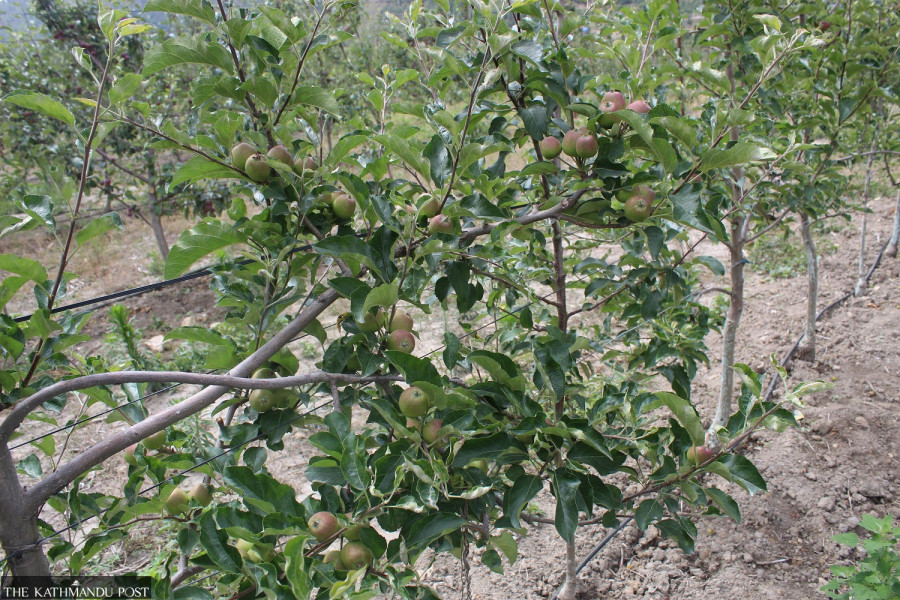Money
Farmers rushing harvest before rain cuts off road
If Karnali Highway is closed, the apples will rot in the orchards, say farmers in Jumla.
DB Budha
For the past three weeks, apple farmer Raj Bahadur Bhakri of Chandannath Municipality in Jumla has been plucking the fruits from the trees in his orchard in a race against time.
The apples aren't ready for harvest, but Bhakri isn't waiting for them to ripen. He wants to sell the fruits to traders for whatever price he can get.
Bhakri is not the only apple farmer in Jumla in such a hurry. Most growers are getting their fruits out of the orchard and selling them as fast as they can.
Apples aren't like bananas, which can be picked substantially unripe and then stored to ripen them. Technicians say early harvesting damages the quality and sweetness of the fruit. When an apple becomes slightly soft and tastes sweet and juicy, it is mature.
But for Surya Neupane of Tatopani and other apple farmers of Jumla, that is of not much interest to them. They have a bigger worry on their minds.
Karnali Highway, the only road that connects remote Jumla with the rest of the country, is prone to landslides and blockage during the rainy season, and the farmers need to get their apples packed and dispatched before it shuts down.
“If the highway is closed, the apples will rot in the orchards,” said Neupane. “So the farmers are anxious to sell their harvest as fast as possible.”
While the farmers are rushing to get their apples to market, the District Agriculture Development Office in Jumla has been requesting them not to pluck the unripe fruits. But they are in no mood to listen to the government officials.
“We are forced to sell unripe apples at low prices. The government has neither built adequate cold stores in Jumla, nor has it guaranteed that it will keep the highway open during the rainy season,” said Bhakri.
“If the government can ensure a market for our apples, we are ready to wait until the fruits ripen.”
The local authorities have asked apple growers to wait till August-end to sell their fruits.
Jumla apples are highly sought after in the domestic market due to their large size and good taste. In addition, the district in Nepal's far west has a reputation for producing organic apples.
Jumla was declared an organic district in 2009 and apple farming was started as a campaign.
Jumla, once associated with the back of beyond, has emerged as a prolific producer of apples. With demand for the fruit growing rapidly, farmers are investing large amounts to go into commercial production.
An apple farmer can earn Rs100,000 to Rs500,000 annually.
After Jumla became linked to the national road network that eased access to market, farmers say their income has increased several fold.
Before Karnali Highway was constructed in 2007, apple farmers in Jumla had no way to send their harvest to market; and they used to sell their apples at whatever price they could get, which was sometimes as little as Rs5 per kg.
The most popular apple variety grown in Jumla is Fuji. Jumla district is home to the country’s largest Fuji apple orchard at Jaljala, Guthichaur Rural Municipality.
Officials of the District Agriculture Development Office are worried that the early picking of apples may dent the reputation of Jumla’s apples.
According to the agriculture office, around 10 tonnes of apples rotted last year as Karnali Highway was cut off by landslides. Farmers are terrified that the same thing may happen this year.
Apple growers of Hima, Sinja, Tatopani and Tila are supplying the unripe apples to markets in Kalikot, Surkhet, Nepalgunj, Kohalpur, Chitwan, Butwal and other urban areas.
Amarbudh Thapa, another apple farmer, says that farmers will not have to sell their unripe apples if the government upgrades Karnali Highway to two lanes and keeps it open year-round.
“The government only keeps apple production data in Jumla, but it is unaware of the difficulties farmers are facing,” said Thapa. “Sending our products to market safely is our biggest concern.”
In the fiscal year 2000-01, the government introduced Karnali Zone Special Agricultural Development Programme to attract the farmers of Jumla towards apple farming.
In 2015-16, the Prime Minister’s Agriculture Modernisation Project listed Jumla as an Apple Super Zone. The project provided technical and financial aid for the farmers to begin commercial apple farming.
As a result, 16,000 out of the 19,000 households in the district are now engaged in apple farming.
According to the agriculture office, apples are grown on 4,250 hectares in Jumla.
"In the last fiscal year, 21,000 tonnes of apples were produced in the district, accounting for 66 percent of the country’s output," said Ganesh Bahadur Adhikari, chief of the District Agriculture Development Office.
“More than 90 percent of the apples grown here are dispatched to different markets.”
Besides unreliable transportation, apple farmers are bothered by increasing pest infestation and lack of fertilisers.
Last year, the farmers sold their apples for Rs40 per kg. They are worried that this year they may not get even that much if the highway is cut off.
“Although the farmers are happy to grow apples, they are concerned by lack of government support to get their fruits to market and ensure a fair price for them,” said farmer Dal Bahadur Basnet.
“Local farmers can make a fortune by growing apples, but it is not a priority for the local, provincial and federal governments.”




 9.7°C Kathmandu
9.7°C Kathmandu















